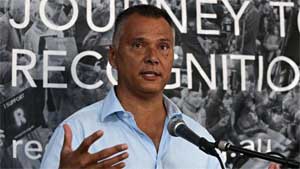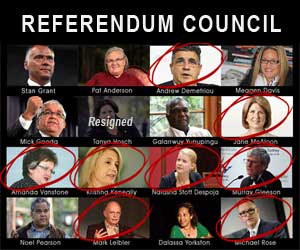'Recognition' - It's time to fund the 'No' vote.
Our well-founded arguments for the case for the 'NO' vote are gaining traction. We must not give up no matter the threat. We must endure and fight for the rights that we have as the sovereigns of the soil and resist being assimilated into a governing system with an intent to destroy our freedoms, our independence and self-determination as First Nations and Peoples. - Ghillar, Michael Anderson

Noel Pearson, Marcia Langton, Patrick Dodson with Mark Leibler in Melbourne last year (Note: Dodson has since resigned from the council and intends to fight undercover from the front line as a politician.)
Mark Leibler Profile - From the 'United Israel Appeal' website

The Con in the new Constitutional Recognition Council continues - time that the case for the 'No' vote is equally funded

Prime Minister Malcolm Turnbull and opposition leader Bill Shorten jointly announced that the indigenous broadcaster, Stan Grant has been appointed to the Referendum Council following the departure of Patrick Dodson, who has resigned to become a Senate candidate for Labor.
The Governments Treachery
The referendum Council will be fighting on three fronts: (1) "Recognise' propaganda advertising campaign with many hundreds of millions from government and corporate sector, (2) A new face on the front line of the Referendum Council in Stan Grant, and (3) Patrick Dodson pushing for Constitutional Recognition in Parliament.
The council is funded by government (15 Million this year) and the 'Recognition' propaganda advertising campaign is funded by International corporations (estimated between 600 - 800 million before 2016 alone)

Enlarge image Circled - non-Indigenous members
Prime Minister's office - Media Release
The Referendum Council members list: Professor Patrick Dodson (co-chair), Mark Leibler AC (co-chair), Pat Anderson AO, Professor Megan Davis, Andrew Demetriou, Murray Gleeson AC QC, Kristina Keneally, Mick Gooda, Tanya Hosch (Resigned), Jane McAloon, Michael Rose, Natasha Stott Despoja AM, Noel Pearson, Amanda Vanstone, Dalassa Yorkston, Dr Galarrwuy Yunupingu AM. (Note: Dodson has since resigned from the council and intends to fight undercover from the front line as a politician.)
Referendim Council Non-Indigenous list
JANE McALOON: Company secretary of PHP Billiton mining Group.
AMANDA VANSTONE: Former Liberal Party Senator and held several ministerial portfolios under the Howard Government. Her time as Minister of Immigration was marked with controversies.
KRISTINA KENEALLY: Former Premier of New South Wales (Labor). She was the Premier when the government began the privatisation of the state's electricity assets.
NATASHA STOTT DESPOJA: Former leader of the Australian Democrats. She a married Liberal Party lobbyist and an unashamed 'Tory' (The British Conservative Party).
MURRAY GLEESON: A Lawyer who later became the Chief Justice of the High Court of Australia and was residing in that position when John Howard suspended the Racial Discrimination Act. He graduated with former PM John Howard, the architect behind 'Recognition'.
MARK LEIBLER (Co-Chair of the Referendum Council): A Tax Lawyer who is now a Senior Partner in 'Arnold Bloch Leibler' a company that works with big business to minimise taxes. He is an active supporter of the illegal occupation of The West Bank in Palestine and one of Australia's most prominent members of the Australian Zionist lobby.
MARK ROSE: A partner and CEO of 'Allens Arthur Robinson' one of Australia's biggest Law firms, a member of the Business Council of Australia and a Fellow of the Australian Institute of Company Directors.
EDIT 2023 There were various changes made to the Referendum Council since 2016, including Stan Grant resigning. Here is the current list: Referendum Council
8 February 2016
Ghillar Michael Anderson Convenor of the Sovereign Union, co-founder of the Aboriginal Embassy and Head of State of the Euahlayi Peoples Republic said from Goodooga today:
Having had successful meetings in Canberra with politicians it is very clear that Aboriginal people are being denied our sovereign inherent rights, because our people themselves have not yet grasped the full extent of their Human Rights under international law, nor have our Peoples been able to exercise the rights recognised by the High Court of Australia in Mabo (No. 2).
The basic fundamentals of First Nations' sovereign governance stem from a governing system that already existed on the land, now known as Australia, and to which the British invaders were not automatically a part of.
When the British arrived there already existed within Australia a set of laws; institutional spiritual/religious practices; defined territories and boundaries of the diverse tribes; external diplomatic relationships between the different Nations; and an economic and trading system.
There is also evidence that has recently come to light where coastal Aboriginal Peoples in the north and east coast of Australia had foreign relationships with the Chinese of the Ming dynasty. '1421 The Year China Discovered the World' Gavin Menzies (2003), Random House e-books
Furthermore, there were trade relations, and marriage relationships between the Yolngu and others in Northern Australia with the Maluku Islands (then known as Moluccas as part of the Dutch East Indies).
Given all of this history there existed a continental common law on the mainland of Australia and beyond. For millennia there existed in Australia settled laws and customs and ancient social practices, which have stood the test of time. This, under international law, confirms our ability as Aboriginal Nations and Peoples to argue the Act of State doctrine, which is now vehemently expressed when dealing with sovereign inherent rights to govern. Mabo confirms this assertion by us as First Nations Peoples, because as the majority judgement says that Aboriginal Peoples' rights to property have survived the British assertion of sovereignty and the whole of Australia knew that from this moment onwards the validity of their sovereignty and sovereignty rights has now been seriously compromised.
Documented evidence shows clearly that the colonial intruders were confronted with a real legal and political dilemma, when they were corresponding with England regarding representative government on and within the land of the new territories they had invaded. Governor Gipps at the time was in conflict with W. C. Wentworth and his patriotic movement, which was demanding self-governance within the colony of New South Wales. They soon realised, however, that they were not the legal sovereigns of the soil and that they had supplanted themselves on and within someone else's territory.
[ Melbourne, A.C.V, 1934, Early Constitutional Development in Australia, New South Wales 1788-1856, Oxford University Press, London. ]
Correspondence between England, Governor Gipps and others showed that the only way in which there could be an exercise of legitimate governance was to first increase the population of British subjects on and within the colony.
The population size of the colony was their nightmare from the outset, because they were constantly out numbered by the native population, which is why Governor Phillip was reporting to England that the size and number of the Aboriginal people was greater than they originally expected. When Phillip changed his location from Botany Bay to Port Jackson, he realised:
[Governor Phillip to Under Secretary Nepean, 9 July 1788 in Historical Records of Australia, Series I. Governors Despatches to and from England, Vol. I, 1788-1798, Library Committee of the Commonwealth Parliament, 1914, p. 56.]
Then the killings started to 'clear' the land of its inhabitants.
Coupled with the size and number of the Aboriginal population and the limited number of British subjects there could be no legitimacy for forming representative government because legitimate government could only be established the 'inhabiting race' and the British subjects were the uninvited guests on this land, they had no legitimacy. Historical records show that all the legitimacy came form the British Crown itself, as it was in the Crown's name that the colonialists claimed the illegitimate rights to occupy the land as 'first discoverers', under the Christian catholic doctrine of the Pope, the Papal Bulls. This meant that there could be no bone fide legislative government established on Australian soil without Orders-in-Council, Letters Patent and Proclamations of the reigning monarchs of England, in whose name this Country was claimed.

These three edicts served as the foundation and justification for the Doctrine of Discovery and set in place a catastrophic chain of events for First Nations Peoples — all in the name of empire expansion and religious righteousness.

Mark Leibler and John Howard
Leibler has stated that 'Winning the hearts and minds of Australians, and confronting a potential 'NO' campaign, will be the biggest challenge' - Koori Mail
In other words, the invader colonial society did not have legal authority, nor legitimacy, to establish representative government on and within the soil of Australia because they had no legal right, as they were not the sovereigns of the soil and the Crown of England under its law were the only ones who could impose a legal right as the first discoverers, claiming absolute right.
Their illegal endeavours continue to haunt them to this day, as Dr Stephen Davis' 1997 paper to the Samuel Griffith Society of Constitutional lawyers confirmed. When giving advice to John Howard at the time when they were proposing the now infamous ten point plan amendments to the Native Title Act, Dr Davis wrote in Native Title: A Path to Sovereignty:
Australians tend to take their sovereignty for granted. That sovereignty is now being contested. We must become more aware of the issues, the players and be prepared to defend our sovereignty if we are to maintain it.
[www.samuelgriffith.org.au/papers/html/volume9/v9chap11.htm]
For all these reasons (and more) we challenge the intent of the Constitutional recognition campaign and demand that the case for the 'No' vote is given equal funding to the case for the 'yes' vote, which is currently the only view funded. It takes a member of parliament to request equal funding for the case for the 'no' vote. The recent comments by Co-chair of the Constitutional Recognition Council, Mr Leibler, as quoted by AAP and the Koori Mail on 3rd January 2016, are enough to send shudders up the spine:
"We are not doing a favour here to Indigenous Australians," he said.
"This is about our self-respect and our dignity as Australians."
Winning the hearts and minds of Australians, and confronting a potential 'no' campaign, will be the biggest challenge for the Council, Mr Leibler said.
Our well-founded arguments for the case for the 'no' vote are gaining traction. We must not give up no matter the threat. We must endure and fight for the rights that we have as the sovereigns of the soil and resist being assimilated into a governing system with an intent to destroy our freedoms, our independence and self-determination as First Nations and Peoples.
 Contact: Ghillar Michael Anderson
Contact: Ghillar Michael AndersonConvenor of Sovereign Union of First Nations and Peoples and Head of State of the Euahlayi Peoples Republic -
Contact Details for Ghillar

